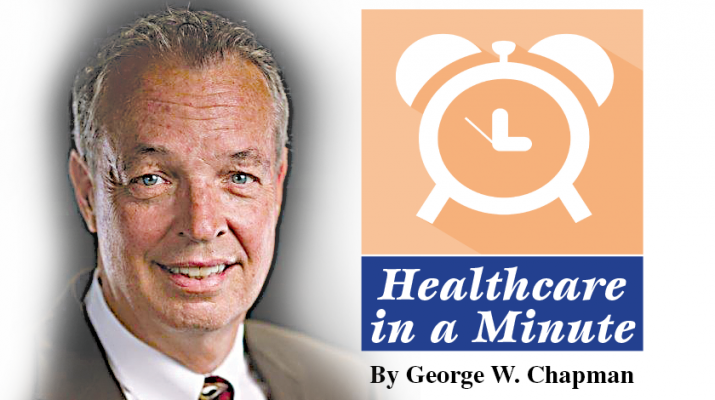By George W. Chapman
Recently signed as law, the Right to Try legislation allows patients with life threatening conditions to “request” medicines that have not yet received final approval by the Food and Drug Administration (FDA). The patient must have exhausted approved treatment options and be unable to participate in clinical trials. Unfortunately, the law does not require drug manufacturers to honor such requests. The law also does not require insurers to pay for the requested drugs. Historically, insurers have refused to pay for experimental treatment.
DRIVe
The U.S Department of Health and Human Services recently introduced the Division of Research, Innovation and Research and Ventures (DRIVe). The new initiative will accelerate innovations that address systematic health concerns by funding innovation, through grants and venture capital investment, that address systematic health concerns. The focus is to save lives lost to aberrations in our healthcare system like sepsis, which is a life-threatening complication caused by infection.
ACA 2019
Uncertainty and confusion are the bane of any business, particularly insurance. The recent termination of the individual mandate, in conjunction with the persistent rumors regarding removing the pre-existing conditions and another attempt to repeal the Affordable Care Act, will cause premiums to increase by as much as $1,000 on the exchanges next year. Meanwhile, President Trump is promising lower premiums and better coverage. Physicians and hospitals remain vigilant, as repealing and replacing the ACA will most likely result in loss of insurance by millions, resulting in bad debts. New Jersey became the second state to enact its own individual mandate, effective January 2019. Massachusetts has had an individual mandate, even before the ACA.
Power Trio
The much ballyhooed triumvirate of JP Morgan Chase, Amazon and Berkshire Hathaway has announced the hiring of their CEO to oversee the healthcare partnership. They were expected to release the name of the CEO by the end of June. The three companies feel they can do a better job than traditional insurers have done for their 1.5 million employees. Skeptics believe the trio has no idea what they are getting into which, ironically, speaks to how bad things are in healthcare. Two of the nation’s top five insurers voiced their concerns. Not being totally naïve, the trio is allowing things to develop over 20 years. Despite some nasty phone calls, JP Morgan CEO Jamie Dimon said “we’re going to take a crack at it.”
Colon cancer
About 270,000 people a year die of colon cancer. It is the second deadliest cancer behind lung cancer which kills about 800,000 a year. The American Cancer Society just released new guidelines recommending that routine screening begin at 45 years old. (It used to be 50 years old.) You should discuss this with your primary care physician. Most insurers should pay for the diagnostic/preventive colonoscopy. If you have a history in your family, your physician might recommend screenings even sooner than 45. With proper screening, this cancer is nearly 100 percent avoidable. Even stage 1 colon cancer has a 80-90 percent survival rate.
Medicare 2026
The Medicare board of trustees reports the inpatient trust fund could be depleted in just eight years (2026). The recent tax cut has accelerated the depletion of the fund by three years. Now is the time for the federal government to negotiate drug prices. Otherwise, the “solution” will most likely be a combination of: increased Medicare premiums to seniors, increased deductibles and coinsurance, decreased benefits and payments to providers.
United/AARP scheme
A class action lawsuit has accused the two organizations — United/AARP — of an illegal rebating or scheme. United is the country’s largest Medigap carrier. Medigap insurance covers what Medicare does not, like certain procedures and any out-of-pocket responsibilities. According to the complaint, in exchange for AARP sponsoring United’s Medigap policy, United rebates almost 5 percent of the premiums received from beneficiaries to AARP, which then uses those rebates to pay for the monthly collective group plan premium in order to bind coverage. In 2016, AARP earned nearly $600 million in royalty payments from United across all insurance products.
Anxiety up
The American Psychiatric Association released a poll that, not surprisingly, indicates we are all more anxious. While millennials have the highest levels of anxiety across all age cohorts, baby boomers had the largest increase in anxiety levels. More women than men admit they are more anxious. Health, safety, finances, relationships and politics are the top stressors. The APA recommends regular exercise, relaxation, healthy eating and more time with family and friends to reduce stress and anxiety.
George W. Chapman is a healthcare business consultant who works exclusively with physicians, hospitals and healthcare organizations. He operates GW Chapman Consulting based in Syracuse. Email him at gwc@gwchapmanconsulting.com.

